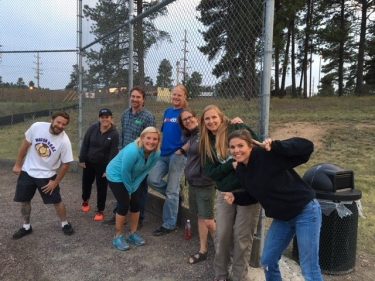2017 Healthy School Hero: Wendy Woodland
Principal, West Jefferson Elementary School
 When it comes to improving health and wellness—whether on an individual basis or at an institutional level —there’s one big hurdle that’s a common thread: time…. or, more accurately, the lack thereof.
When it comes to improving health and wellness—whether on an individual basis or at an institutional level —there’s one big hurdle that’s a common thread: time…. or, more accurately, the lack thereof.
Wendy Woodland has experienced that on both sides of the coin. A mother of three, Woodland loves the outdoors— not a hard sell when you live in the beautiful Colorado foothills, southwest of Denver. She says she feels like a better person when she’s out running, water and snow skiing, hiking and otherwise exercising on a regular basis. Her daughters, 8, 6 and 2, are much happier and in better moods when they’re able to get outside and be active, as well.
But, as we know, life often manages to get in the way.
“My challenge is finding the time to get outside,” Woodland says. “Sometimes it feels like a luxury that I can’t afford time-wise.”
Woodland’s time is certainly at a premium. In addition to being a busy wife and mother, she’s the principal of West Jefferson Elementary School in nearby Aspen Park. In that role, she knows well the challenge of including more movement in an already jam-packed school day. Because teachers feel limited in the time they have for classroom instruction, she explains, it can be difficult to get everyone on board with new health and wellness initiatives around school breakfast, mindfulness and yoga, additional movement, additional time for lunch, and more.
Yet she also appreciates the importance of movement; research supports the link between physical activity and learning, and Woodland has seen it play out in her own girls. To her, it’s essential.
“As the school leader, I feel I can support new ideas and help kids, staff and families see that being active should be a priority and does benefit students in terms of learning as well,” she says.
So, since Woodland couldn’t fit more movement into the existing school day, she did the natural next thing: She worked to extend it.
After thorough planning and consulting with the district’s transportation department, Jefferson got the go-ahead to start its school day 20 minutes earlier. At first administrators used the extra time to extend students’ daily recess, but after seeing research that more opportunities for movement are better for the brain than one longer one, they changed the schedule to give every child two recesses each day. This year, they’ll also allow kids more time to eat lunch. Woodland says students and teachers have responded well to the changes.
“It helps teachers feel better about lost time,” she says. “Plus, they have finally begun to see the payoff when kids are healthy, have had movement, and know how to focus when necessary. Teachers get excited and then start to look for more ways to impact students’ health in a positive way.”
Jefferson has been able to make other exciting changes with the help of outside organizations and individuals, Woodland says. Partnering with Calming Kids, a nonprofit that works to reduce bullying and increase students’ concentration, the school added yoga and mindfulness exercises to the school day two years ago and this year plans to continue bringing in a yoga teacher and to integrate mindfulness into the classroom through brain breaks.
In Fall 2016, the school worked with Action for Healthy Kids to take the SuperFit School Challenge in order to raise awareness about health and wellness as well as funds to support their healthy initiatives. In addition to being a lot of fun, Woodland says, the fundraiser introduced families to pledging for movement and goal setting and gave the staff some great ideas for this fall’s school-wide fundraiser: the Superhero Sprint fun run. Jefferson was able to raise more than $29,000 through donations and pledges for the SuperFit School Challenge and the Superhero Sprint— “and we didn’t sell any cookies, candy or other junk food!” Woodland exclaims.
Always one to encourage kids not only to be active, but to be active outdoors to take in those beautiful surroundings, Woodland has also worked to start a 100 Mile Club, build a school garden that students in all grade levels will be able to use throughout the 2017-2018 school year, and earmark part of the money from this year’s fundraiser for improving the school grounds through a fitness path and much more.
Fitting more movement into a busy schedule may be challenging, but Woodland has proved that with perseverance and a little creativity, it’s entirely possible.
“The students at my school have benefited from our active focus,” she says. “When I see them more engaged and loving being at school, I am empowered and our staff is reaffirmed in our work around student and staff climate and culture.”
Categories: School Engagement, Colorado